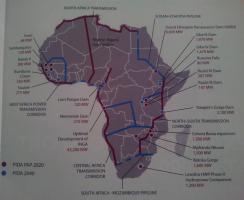BY ANDUALEM SISAY GESSESSE
The 2017 World Hydropower Congress opened in Addis Ababa, Ethiopia on Tuesday focused on addressing the effects of climate change on hydropower development.
“Development is unthinkable in the absence of adequate and affordable energy”. I would like to reiterate the need for collective efforts to mitigate the effects of climate change”, said Prime Minister of Ethiopia Hailemariam Desalegn.
Recently the World Bank has launched an initiative to produce a set of climate resilience guidelines which aim to ensure that both existing and future hydropower projects are resilient to climate change.
Dr. Abdalla Hamdok, Acting Executive Secretary of the United Nations Economic Commission for Africa for Africa (UNECA), on his part indicated that Africa should take cautious approaches while undertake hydropower development giving special attention to the social and environmental impact.
“…it is equally important to guard against negative impacts of hydropower development and to pay close attention to climate resilience and social inclusion,” he said, mentioning evidences of such problems from experiences of Zambia and Mozambique.
In addition to the effects of climate change, the high cost for development of hydropower in Africa is also mentioned as the major challenge why the continent hasn’t fully utilized its hydropower potential.
“The cost of generating one megawatts double in Africa compared to other parts of the world. 3.5 million USD. While it is around one million dollars for generating one megawatts of electricity in America or other developed countries. Something has to be done through such meetings and platforms,” says, Soteri Gatera, chief of industrialization and infrastructure section regional integration and trade division at UNECA.
“If we take the grand Inga Dam of Congo for instance it has the capacity to meet half of the electricity demand of Africa. But because of the high cost of generating hydropower from it, we haven’t utilized it fully until today,” he said.
He advised African governments to liberalize energy market from generation to distribution. This will bring prices. He also suggested to African countries the domestication and localization of the technologies used to produce hydroelectric so that they don’t pay for the technology.
Currently some 600 million people (over half of the total population of Africa) do not have access to electricity. Globally a total of 1.2 billion people do not have access to electricity.
In his opening remark Prime Minister Hailemariam also stressed hydropower as being “crucial to providing reliable and sustainable energy development for African economies”.
The congress themed ‘Better hydro in an interconnected world’, will be sharing experiences of different countries such as Russia, China, among others to Africa in the coming few days.
In Africa hydropower contributes the largest share in renewable energy mix with a total installed capacity of 34 GW. In comparison China the largest hydropower generator in the world with a total of 319 GW installed hydropower capacity by 2015.
Currently there are various incentives including African Union Commissions’ Programme for Infrastructure Development in Africa (PIDA). At continental level, PIDA aims to implement nine hydropower projects by 2020 and 20 hydropower projects by 2040 totaling over 54 GW and four power transmission corridors in Africa.
“It is imperative for us to accelerate the green and low-carbon transition. The key to realising that is to bring forward a new energy supply system prioritised by clean energy development and power supply with large-scale optimal allocation of the Global Energy Interconnection platform,” said Liu Zhenya, chairman of the Global Energy Interconnection Development and Cooperation Organization (GEIDCO).

